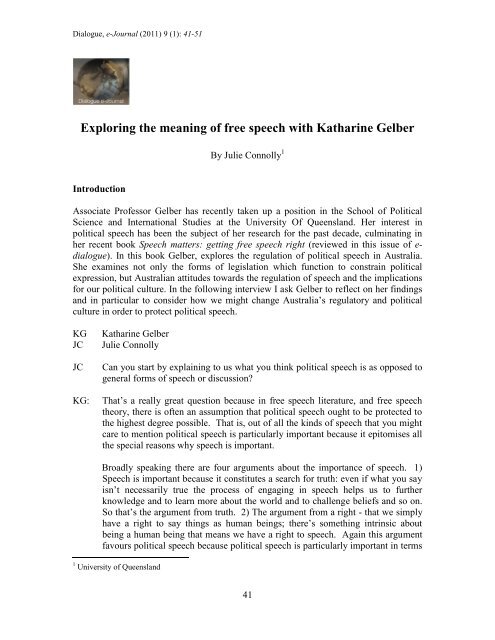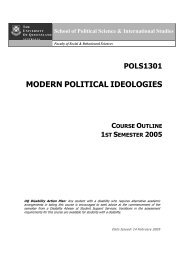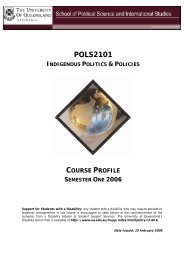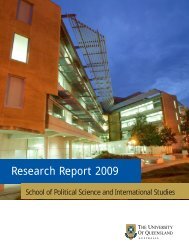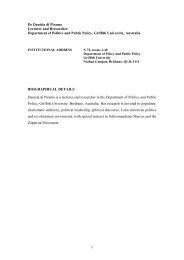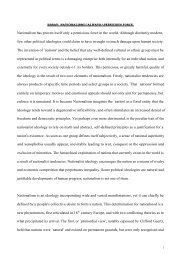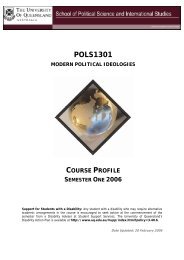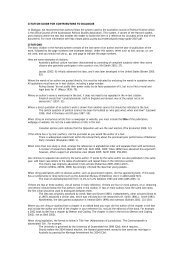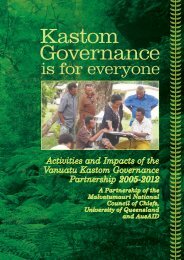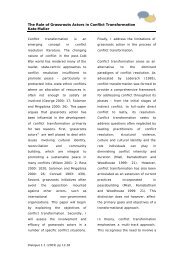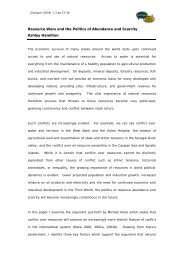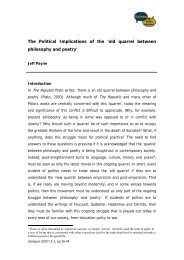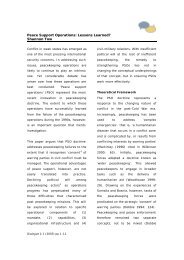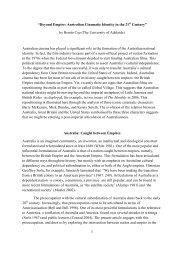Exploring the meaning of free speech with Katharine Gelber
Exploring the meaning of free speech with Katharine Gelber
Exploring the meaning of free speech with Katharine Gelber
Create successful ePaper yourself
Turn your PDF publications into a flip-book with our unique Google optimized e-Paper software.
Dialogue, e-Journal (2011) 9 (1): 41-51<br />
<strong>Exploring</strong> <strong>the</strong> <strong>meaning</strong> <strong>of</strong> <strong>free</strong> <strong>speech</strong> <strong>with</strong> <strong>Katharine</strong> <strong>Gelber</strong><br />
By Julie Connolly 1<br />
Introduction<br />
Associate Pr<strong>of</strong>essor <strong>Gelber</strong> has recently taken up a position in <strong>the</strong> School <strong>of</strong> Political<br />
Science and International Studies at <strong>the</strong> University Of Queensland. Her interest in<br />
political <strong>speech</strong> has been <strong>the</strong> subject <strong>of</strong> her research for <strong>the</strong> past decade, culminating in<br />
her recent book Speech matters: getting <strong>free</strong> <strong>speech</strong> right (reviewed in this issue <strong>of</strong> e-<br />
dialogue). In this book <strong>Gelber</strong>, explores <strong>the</strong> regulation <strong>of</strong> political <strong>speech</strong> in Australia.<br />
She examines not only <strong>the</strong> forms <strong>of</strong> legislation which function to constrain political<br />
expression, but Australian attitudes towards <strong>the</strong> regulation <strong>of</strong> <strong>speech</strong> and <strong>the</strong> implications<br />
for our political culture. In <strong>the</strong> following interview I ask <strong>Gelber</strong> to reflect on her findings<br />
and in particular to consider how we might change Australia’s regulatory and political<br />
culture in order to protect political <strong>speech</strong>.<br />
KG<br />
JC<br />
JC<br />
KG:<br />
<strong>Katharine</strong> <strong>Gelber</strong><br />
Julie Connolly<br />
Can you start by explaining to us what you think political <strong>speech</strong> is as opposed to<br />
general forms <strong>of</strong> <strong>speech</strong> or discussion?<br />
That’s a really great question because in <strong>free</strong> <strong>speech</strong> literature, and <strong>free</strong> <strong>speech</strong><br />
<strong>the</strong>ory, <strong>the</strong>re is <strong>of</strong>ten an assumption that political <strong>speech</strong> ought to be protected to<br />
<strong>the</strong> highest degree possible. That is, out <strong>of</strong> all <strong>the</strong> kinds <strong>of</strong> <strong>speech</strong> that you might<br />
care to mention political <strong>speech</strong> is particularly important because it epitomises all<br />
<strong>the</strong> special reasons why <strong>speech</strong> is important.<br />
Broadly speaking <strong>the</strong>re are four arguments about <strong>the</strong> importance <strong>of</strong> <strong>speech</strong>. 1)<br />
Speech is important because it constitutes a search for truth: even if what you say<br />
isn’t necessarily true <strong>the</strong> process <strong>of</strong> engaging in <strong>speech</strong> helps us to fur<strong>the</strong>r<br />
knowledge and to learn more about <strong>the</strong> world and to challenge beliefs and so on.<br />
So that’s <strong>the</strong> argument from truth. 2) The argument from a right - that we simply<br />
have a right to say things as human beings; <strong>the</strong>re’s something intrinsic about<br />
being a human being that means we have a right to <strong>speech</strong>. Again this argument<br />
favours political <strong>speech</strong> because political <strong>speech</strong> is particularly important in terms<br />
1 University <strong>of</strong> Queensland<br />
41
<strong>Exploring</strong> <strong>the</strong> <strong>meaning</strong> <strong>of</strong> <strong>free</strong> <strong>speech</strong> 42<br />
<strong>of</strong> what it means to be as a human being living in a society, living in a<br />
community. 3) The argument from democracy, also privileges political <strong>speech</strong>:<br />
<strong>the</strong> argument that we need to be able to engage in <strong>speech</strong> in order to self-govern,<br />
and to do that in a democratic way. 4) The argument from self-fulfilment:<br />
engaging in <strong>speech</strong> so that we develop our own individual capacities.<br />
In <strong>free</strong> <strong>speech</strong> literature <strong>the</strong>re’s an assumption that political <strong>speech</strong> ought to be<br />
particularly protected. However, in that same literature <strong>the</strong>re’s very little clear<br />
elucidation <strong>of</strong> what political <strong>speech</strong> is. In my work I have tended to think <strong>of</strong><br />
political <strong>speech</strong> as that <strong>speech</strong> which is facilitative <strong>of</strong> both one’s ability to live<br />
socially and to govern socially - to self-govern, that is, to have a society that is<br />
democratic in which we can participate.<br />
So it helps us; <strong>speech</strong> helps us make democracy happen; <strong>speech</strong> is part <strong>of</strong> making<br />
democracy happen. For us as citizens, <strong>speech</strong> is constitutive <strong>of</strong> what we need to<br />
be able to do to develop our ability to participate in relevant democratic<br />
processes. So at both <strong>the</strong> individual level and <strong>the</strong> social level, political <strong>speech</strong> is<br />
<strong>the</strong> means by which we make democracy happen.<br />
JC<br />
KG:<br />
JC:<br />
KG:<br />
Can I follow up? How do you distinguish political <strong>speech</strong> from o<strong>the</strong>r forms <strong>of</strong><br />
<strong>speech</strong>? Has <strong>the</strong> distinction to do <strong>with</strong> <strong>the</strong> arena in which <strong>speech</strong> takes place? Or<br />
is it about <strong>the</strong> content <strong>of</strong> <strong>the</strong> <strong>speech</strong>?<br />
Again, that is a very good question. But it is not very clearly answerable.<br />
Three types <strong>of</strong> <strong>speech</strong> are set <strong>of</strong>f against <strong>free</strong> <strong>speech</strong>. Commercial <strong>speech</strong> is not<br />
regarded as, or is set <strong>of</strong>f as distinct from political <strong>speech</strong>: even in <strong>the</strong> United<br />
States, commercial <strong>speech</strong> is much more easily regulable than o<strong>the</strong>r types <strong>of</strong><br />
<strong>speech</strong>. Obscenity, particularly pornography, certain types <strong>of</strong> pornographies, is<br />
also set <strong>of</strong>f as distinct from political <strong>speech</strong>. And <strong>the</strong> third one might be artistic<br />
<strong>speech</strong>. But again <strong>the</strong>re’s a blurry line because it depends on <strong>the</strong> kind <strong>of</strong> art you’re<br />
talking about. Some art, which seeks to be a sort <strong>of</strong> expression <strong>of</strong> creativity,<br />
might not be definable as political <strong>speech</strong>. But some art I can think <strong>of</strong> would be<br />
very political.<br />
The distinction you seem to be pointing towards has to do <strong>with</strong> <strong>the</strong> purpose <strong>of</strong> <strong>the</strong><br />
content <strong>of</strong> <strong>the</strong> <strong>speech</strong>. But in your book you discuss <strong>the</strong> use <strong>of</strong> flags and also<br />
certain kinds <strong>of</strong> artistic enterprise as political. Why is it, in particular, that you<br />
see flag use as a form <strong>of</strong> political <strong>speech</strong>?<br />
What I’m interested in is what <strong>speech</strong> does as opposed to trying to define political<br />
<strong>speech</strong> <strong>with</strong> reference to its content, or <strong>with</strong> reference to <strong>the</strong> context in which it’s<br />
spoken, or <strong>with</strong> reference to its audience, or <strong>with</strong> reference to its speaker. I guess<br />
all <strong>of</strong> those things are elements <strong>of</strong> it, but what I’m interested in is what <strong>speech</strong><br />
does.
43 Interview <strong>with</strong> <strong>Katharine</strong> <strong>Gelber</strong><br />
When somebody raises a national flag, or burns or desecrates a national flag, <strong>the</strong>y<br />
are trying to say something. So that to me is <strong>speech</strong>, quite clearly an example <strong>of</strong><br />
<strong>speech</strong>, even though not everyone might agree <strong>with</strong> that. It’s also widely<br />
recognised now that <strong>the</strong> distinction between what I speak, or what I say, and what<br />
I do, is quite difficult to sustain at a <strong>the</strong>oretical level. There’s a very wide body <strong>of</strong><br />
literature that acknowledges that when we say things we are also doing things. So<br />
if I knock on your door and you say come in, you’re not just saying come in<br />
because it’s your opinion, you’re actually doing something, you’re giving me<br />
permission to come into <strong>the</strong> room. That’s a very simple example, but <strong>the</strong>re are<br />
many more complex examples in society. When we say something we are pretty<br />
much always also doing something. The things that we are doing might have<br />
greater or lesser importance, greater or lesser significance, greater or lesser impact<br />
on <strong>the</strong> people who hear it, but we’re always doing something by speaking.<br />
JC:<br />
KG:<br />
That’s interesting because it’s <strong>the</strong> kind <strong>of</strong> definition that enables us to look at a<br />
range <strong>of</strong> activities as <strong>speech</strong>, but also to include people who don’t have a capacity<br />
to speak in <strong>the</strong> way that we usually understand it. I was going to ask you next<br />
why political <strong>speech</strong> is relevant to human rights and democracy. You started to<br />
answer <strong>the</strong> question already but do you have any fur<strong>the</strong>r thoughts on <strong>the</strong> particular<br />
relationship between <strong>speech</strong> and democracy? How is it that <strong>speech</strong> makes<br />
democracy possible?<br />
I think that many people assume that for democracy to happen people have to be<br />
able to participate and that somehow if by protecting <strong>free</strong> <strong>speech</strong> what we do is<br />
not interfere in people’s ability to speak <strong>the</strong>n <strong>the</strong>y will somehow automatically be<br />
able to be engaged in <strong>the</strong> democracy. And so <strong>the</strong> dominant ideas about how to<br />
protect <strong>free</strong> <strong>speech</strong> are what you might think <strong>of</strong> as negative in human rights terms.<br />
That is, <strong>the</strong>y emphasise that government not interfere: that people have a right to<br />
speak when <strong>the</strong>y are <strong>free</strong> from restraint by government. So in human rights<br />
terms, it is a very negatively conceived <strong>free</strong>dom. I think that’s inadequate. I<br />
think that in order for any <strong>free</strong>dom to be <strong>meaning</strong>ful we must also think <strong>of</strong> it in<br />
positive terms, if you want to use human rights language. And I think that should<br />
apply to <strong>speech</strong> just as much to anything else.<br />
So to me <strong>speech</strong> is important to democracy. Not just in so far as a government<br />
doesn’t interfere in people’s right to speak, but also where a government or a<br />
polity recognises that not everyone has <strong>the</strong> same ability to speak; that some<br />
people’s <strong>speech</strong>, even when <strong>the</strong>y speak, might not be heard by o<strong>the</strong>rs because<br />
<strong>the</strong>y are systematically marginalised in society. We hear this <strong>of</strong>ten, for example<br />
in feminist arguments - when a woman says no and it’s not heard by a man - all<br />
those kind <strong>of</strong> situations. And I think this insight can be applied more broadly. I<br />
think for <strong>speech</strong> to be <strong>meaning</strong>ful in a democracy, <strong>the</strong> democracy must do more<br />
than not interfere in people’s rights to speak, it must have a positive or enabling<br />
concept <strong>of</strong> what <strong>the</strong> polity must do so that citizens can participate in making <strong>the</strong>ir<br />
own democratic practice.
<strong>Exploring</strong> <strong>the</strong> <strong>meaning</strong> <strong>of</strong> <strong>free</strong> <strong>speech</strong> 44<br />
JC:<br />
KB:<br />
And do you have any ideas about what that might mean? Is it about creating<br />
forums for discussion? Is it about controlling media ownership or regulating<br />
media ownership? What kinds <strong>of</strong> things might a polity do to that end?<br />
Those are very good examples. There are o<strong>the</strong>rs. Ano<strong>the</strong>r example might be that<br />
where <strong>the</strong>re is a particularly marginalised community it might be incumbent on<br />
policy makers to provide that sub group <strong>with</strong> particular resources, educational<br />
resources for example, and material resources to enable <strong>the</strong>m, to empower <strong>the</strong>m<br />
to speak. Ei<strong>the</strong>r to speak back in response to events that have happened to <strong>the</strong>m,<br />
or generally to speak and express <strong>the</strong>ir view. I think <strong>the</strong>re’s a very strong<br />
educational role in encouraging people and providing people <strong>with</strong> <strong>the</strong> conditions<br />
and capabilities <strong>the</strong>y need to be able to speak. And that can apply at lots <strong>of</strong> levels<br />
where it doesn’t now apply.<br />
But, yes, I would also include media ownership laws. I would also include how<br />
we conduct elections and campaigns in elections, as examples <strong>of</strong> <strong>the</strong> kinds <strong>of</strong><br />
things that polities might do. Recognising <strong>the</strong> dominance by those <strong>with</strong> money in<br />
election campaigns and <strong>the</strong> difficulty for smaller groups and marginalised groups<br />
and those not <strong>with</strong> money to be heard. I think that’s an important consideration.<br />
There’s a whole realm <strong>of</strong> public policy areas where this might be applicable.<br />
JC:<br />
KG:<br />
JC:<br />
KG:<br />
One <strong>of</strong> <strong>the</strong> questions I was going to ask, and it picks up on something you said<br />
before about political <strong>speech</strong> being distinguished from just, say, commercial<br />
<strong>speech</strong>, obscenity and what was <strong>the</strong> third one?<br />
Artistic.<br />
Artistic. How does hate <strong>speech</strong> fit into that taxonomy?<br />
A lot <strong>of</strong> hate <strong>speech</strong> is political <strong>speech</strong>. This is why in countries that support a<br />
very libertarian approach to <strong>free</strong> <strong>speech</strong>, like <strong>the</strong> United States, it has been so<br />
difficult to produce policy that regulates hate <strong>speech</strong> that can survive First<br />
Amendment constraints. The First Amendment, in its current incarnation - in its<br />
current understanding <strong>of</strong> what <strong>the</strong> first amendment means - it’s very much seen as<br />
protecting political <strong>speech</strong>. So people who support <strong>the</strong> first amendment approach,<br />
a very libertarian approach to <strong>free</strong> <strong>speech</strong> tend to say:<br />
“Well yes hate <strong>speech</strong> might be horrible and it might even be<br />
harmful [<strong>the</strong>re are even concessions that it’s harmful], but<br />
never<strong>the</strong>less it’s political <strong>speech</strong>. And we must protect political<br />
<strong>speech</strong> if we are to allow <strong>the</strong> public to determine what is right<br />
and what approach it wants to take to policies and so <strong>the</strong><br />
government can’t prejudge matters. That’s not democratic; it’s<br />
inherent in democracy that people are able to make those<br />
decisions. So even if this <strong>speech</strong> is abhorrent, even if <strong>the</strong> <strong>speech</strong><br />
is harmful, we never<strong>the</strong>less must allow it.”
45 Interview <strong>with</strong> <strong>Katharine</strong> <strong>Gelber</strong><br />
I agree in <strong>the</strong> sense that much hate <strong>speech</strong> is political <strong>speech</strong>, I do agree. But I<br />
don’t agree <strong>with</strong> <strong>the</strong> libertarians that <strong>the</strong>refore we can do nothing about it.<br />
JC:<br />
KG:<br />
JC:<br />
KG:<br />
JC:<br />
KG:<br />
JC:<br />
Can you give me an example <strong>of</strong> how hate <strong>speech</strong> is political <strong>speech</strong>?<br />
Okay, pretty much any expression that is intended to maintain an existing<br />
systemic discrimination and marginalisation, that is <strong>the</strong>reby hateful, can be seen<br />
as political <strong>speech</strong>. This includes even <strong>the</strong> crude kind <strong>of</strong> in-your-face epi<strong>the</strong>ts that<br />
you might think <strong>of</strong>. I was reading a case this morning about a homosexual man<br />
who lodged anti-vilification complaint in NSW because a man moved into his<br />
neighbourhood and started hurling homophobic abuse at him. So at one level<br />
that’s just horrible homophobic abuse and you might not think <strong>of</strong> it as political,<br />
but on <strong>the</strong> o<strong>the</strong>r hand what <strong>the</strong> abuser was doing in making those comments was<br />
seeking to perpetuate an existing marginalisation against homosexuals, whe<strong>the</strong>r<br />
he was aware <strong>of</strong> that or not. The context, <strong>the</strong> lifeworld, to use a Habermasian<br />
term, <strong>with</strong>in which he made those statements is one in which same sex attracted<br />
people have, for a very long time, encountered discrimination and<br />
marginalisation. So by throwing those kinds <strong>of</strong> epi<strong>the</strong>ts around he, <strong>the</strong> speaker,<br />
was making a claim that in this lifeworld, in this context, in Australia in <strong>the</strong> 21 st<br />
century, it’s still okay for gay people to be marginalised and discriminated against<br />
and targeted for violence and abuse because <strong>of</strong> <strong>the</strong>ir same sex attraction. So even<br />
though it might have been at first blush just an insulting epi<strong>the</strong>t, when you<br />
investigate more closely it was still an example <strong>of</strong> political <strong>speech</strong>.<br />
I’ve <strong>of</strong>ten wondered about <strong>the</strong> distinction between hate <strong>speech</strong> and straight<br />
forward slander and libel where you also say horrible things about people that<br />
aren’t necessarily true. And <strong>the</strong> distinction that is drawn has to do <strong>with</strong> <strong>the</strong><br />
relationship between <strong>speech</strong> and a form <strong>of</strong> structural injustice. Is that correct?<br />
For me, it is. For me that’s very much <strong>the</strong> differentiation.<br />
So where would something like Holocaust Denial fit in to that? Is that a form a<br />
hate <strong>speech</strong>?<br />
Yes, in my view <strong>the</strong>re’s not a doubt that Holocaust Denial is hate <strong>speech</strong>. In fact<br />
internationally it’s one <strong>of</strong> <strong>the</strong> most widely recognised forms <strong>of</strong> hate <strong>speech</strong><br />
because it seeks to perpetuate a very gross anti-Semitism that contributed so<br />
directly to <strong>the</strong> slaughter <strong>of</strong> millions <strong>of</strong> Jewish people. So <strong>the</strong>re’s just such a clear<br />
relationship between Holocaust Denial and marginalisation <strong>of</strong> people who have<br />
experienced discrimination for a very long time historically - it’s very clear case<br />
<strong>of</strong> hate <strong>speech</strong>.<br />
Okay. In your book you argue that Australians take <strong>the</strong>ir rights to <strong>free</strong> <strong>speech</strong> for<br />
granted. I was wondering what you meant by that? How does that manifest in<br />
our political culture?
<strong>Exploring</strong> <strong>the</strong> <strong>meaning</strong> <strong>of</strong> <strong>free</strong> <strong>speech</strong> 46<br />
KG:<br />
In <strong>the</strong> book I cite some survey data that show that if you ask Australians, do you<br />
think you have <strong>free</strong> <strong>speech</strong>, a vast majority <strong>of</strong> <strong>the</strong>m will say yes. And if you ask<br />
<strong>the</strong>m, do you think we should have <strong>free</strong> <strong>speech</strong>, a vast majority <strong>of</strong> <strong>the</strong>m will say<br />
yes: <strong>the</strong>re is a wide spread assumption that <strong>free</strong> <strong>speech</strong> exists in Australia, that<br />
<strong>free</strong> <strong>speech</strong> is important and also that somehow it is part <strong>of</strong> <strong>the</strong> national fabric.<br />
When I say <strong>the</strong>y take it for granted what I mean is that, as I try to show in <strong>the</strong><br />
book, <strong>the</strong> evidence shows that that commitment to <strong>free</strong> <strong>speech</strong> is only skin deep<br />
and that when you push people on whe<strong>the</strong>r people who say things that are a bit<br />
uncomfortable or that are harmful or that make <strong>the</strong>m feel a bit uncomfortable -<br />
and if you press <strong>the</strong>m and say well should people be allowed to say this or should<br />
people be allowed to say that - <strong>the</strong>ir support for <strong>free</strong> <strong>speech</strong> crumbles very<br />
quickly.<br />
I don’t think that <strong>the</strong> Australian public very well understands that <strong>the</strong> true test <strong>of</strong><br />
whe<strong>the</strong>r we have <strong>free</strong> <strong>speech</strong> is what happens at <strong>the</strong> coal face on a day to day<br />
level: whe<strong>the</strong>r people allow somebody to say something even though it makes<br />
<strong>the</strong>m feel uncomfortable. In Australia, <strong>the</strong>re is a lot <strong>of</strong> evidence that people don’t<br />
want <strong>speech</strong> to be heard if <strong>the</strong>y feel that it is uncomfortable. That’s why I think<br />
<strong>the</strong>y take <strong>free</strong> <strong>speech</strong> for granted.<br />
JC:<br />
KG:<br />
You’ve mentioned a couple <strong>of</strong> times <strong>the</strong> notion that <strong>speech</strong> can be harmful. I<br />
remember that saying from childhood: sticks and stones will break my bones but<br />
words will never hurt me. We’re brought up <strong>with</strong> this notion that <strong>speech</strong> doesn’t<br />
harm. So how do you think <strong>speech</strong> might be harmful?<br />
I don’t agree at all <strong>with</strong> that childhood poem or rhyme, or whatever it is, because I<br />
think that is what people used to tell children in <strong>the</strong> past to help <strong>the</strong>m cope <strong>with</strong><br />
<strong>the</strong> hurt that <strong>the</strong>y were feeling. But in a way it’s dismissing <strong>the</strong> hurt that <strong>the</strong>y<br />
were really feeling and dismissing <strong>the</strong> harm that <strong>the</strong>y may have felt.<br />
I guess <strong>the</strong>re are two distinct ways in which <strong>speech</strong> can be harmful. But I don’t<br />
want to suggest that everyone who’s ever targeted by hate <strong>speech</strong> is immediately<br />
victimised and <strong>the</strong>refore marginalised, disempowered and silenced. In fact, some<br />
people are galvanised by being targeted by hate <strong>speech</strong>. They’re galvanised into<br />
response. They’re galvanised into solidarity <strong>with</strong> o<strong>the</strong>rs who’ve experienced <strong>the</strong><br />
same fate and <strong>the</strong>y’re galvanised to fight discrimination, <strong>the</strong> discrimination that<br />
hate <strong>speech</strong> represents. So I don’t want to suggest that everyone who’s ever<br />
targeted by harmful hate <strong>speech</strong> is somehow victimised and assumes that identity.<br />
But to go back to your question about how <strong>speech</strong> harms; harmful hate <strong>speech</strong><br />
might lead to fur<strong>the</strong>r acts <strong>of</strong> violence or discrimination. Hate <strong>speech</strong> is capable <strong>of</strong><br />
creating a climate <strong>with</strong>in which fur<strong>the</strong>r acts <strong>of</strong> violence are more liable to occur.<br />
We have plenty <strong>of</strong> examples <strong>of</strong> this. What happened in Germany in <strong>the</strong> 1930’s is<br />
a very clear example, but <strong>the</strong>re are o<strong>the</strong>rs. What happened in Rwanda much more<br />
recently for example. In Australia, arguably, <strong>the</strong> hate <strong>speech</strong> and misinformation<br />
that has been propagated around refugees has contributed to an environment
47 Interview <strong>with</strong> <strong>Katharine</strong> <strong>Gelber</strong><br />
<strong>with</strong>in which it’s possible for people to carry out acts that ten years ago would<br />
have seen, been seen much more clearly as a breach <strong>of</strong> human rights. So <strong>the</strong>re’s<br />
that kind <strong>of</strong> argument about what it leads to.<br />
Then <strong>the</strong>re’s a second argument that hate <strong>speech</strong> is in <strong>of</strong> itself harmful: hate<br />
<strong>speech</strong> is a discursive act <strong>of</strong> discrimination. In saying things that constitute hate<br />
<strong>speech</strong>, not just insults but statements that connect <strong>with</strong> systemic marginalisation<br />
and <strong>the</strong>refore constitute hate <strong>speech</strong>, you are enacting that discrimination<br />
discursively. And so it is in and <strong>of</strong> itself an act <strong>of</strong> discrimination. Most people<br />
would agree that <strong>the</strong> first interpretation: that hate <strong>speech</strong> is <strong>speech</strong> which leads to<br />
something else. It might incite violence. It might incite hostility. It might lead to<br />
discrimination or violence. The second definition, <strong>the</strong> one that suggests that hate<br />
<strong>speech</strong> is in itself harmful, is less widely accepted. I accept it but not everyone<br />
does.<br />
JC:<br />
KG:<br />
The debate regarding whe<strong>the</strong>r or not if hate <strong>speech</strong> promotes violence is<br />
particularly controversial when you think about pornography. There is a school<br />
<strong>of</strong> feminist thinking that argues that pornography is a form <strong>of</strong> hate <strong>speech</strong> that<br />
makes violence against women more likely or possible, part <strong>of</strong> an acceptable<br />
social imaginary. And I ask you about this partially because pornography wasn’t<br />
one <strong>of</strong> <strong>the</strong> issues that you considered in <strong>the</strong> book and has been brought up <strong>with</strong><br />
you on a number <strong>of</strong> occasions, not only by me. So I was wondering what is your<br />
response to those kinds <strong>of</strong> arguments?<br />
I didn’t discuss pornography in this book because pornography deserves a book<br />
on its own.<br />
I do think that much <strong>of</strong> what passes for pornography is deeply misogynist, that it<br />
contributes to a climate <strong>with</strong>in which women are denied agency. It presents<br />
women as passive, and it certainly denies women real forms <strong>of</strong> sexual pleasure. It<br />
insinuates and implies, or actually says directly, that <strong>the</strong> best form <strong>of</strong> sexual<br />
pleasure is one in which <strong>the</strong> men’s erotic desires are first and foremost secured<br />
and hers are secondary. So it is deeply misogynist in many ways.<br />
However, I think that much <strong>of</strong> what goes on in <strong>the</strong> media, and in portrayals <strong>of</strong><br />
women in society, is also deeply misogynist. And by that I actually do mean <strong>the</strong><br />
advertisements that we see on <strong>the</strong> television every night for cleaning products -<br />
particularly toilet cleaners I guess are a favourite <strong>of</strong> mine, a pet hate <strong>of</strong> mine -<br />
those kinds <strong>of</strong> things. We are constantly bombarded. You go into any car<br />
workshop and look at <strong>the</strong> calendars on <strong>the</strong> wall: naked women are used to sell<br />
everything from car parts to whatever. Women are portrayed, in <strong>the</strong> advertising<br />
media, as most content and most happy when cleaning <strong>the</strong>ir toilets and servicing<br />
<strong>the</strong> needs <strong>of</strong> <strong>the</strong>ir families. There’s very little recognition <strong>of</strong> women’s intellectual<br />
capacity in those advertisements. There’s very little recognition <strong>of</strong> women’s<br />
agency as anything o<strong>the</strong>r than ei<strong>the</strong>r mo<strong>the</strong>rs or lovers. So I find all <strong>of</strong> that kind
<strong>Exploring</strong> <strong>the</strong> <strong>meaning</strong> <strong>of</strong> <strong>free</strong> <strong>speech</strong> 48<br />
<strong>of</strong> advertising also deeply misogynist and contributing to a very similar climate in<br />
which women’s agency is denied and so on.<br />
I, <strong>the</strong>refore, am unsure in my own mind whe<strong>the</strong>r <strong>the</strong> sexual component <strong>of</strong> what<br />
happens in pornography sufficiently differentiates it from all that o<strong>the</strong>r misogynist<br />
stuff out <strong>the</strong>re, to make it particularly deserving <strong>of</strong> regulation. And I should stress<br />
in this I am talking about <strong>the</strong> mainstream pornography, what you might call <strong>the</strong><br />
boring pornography, as it’s <strong>the</strong> mainstream pornography where women are just<br />
denied agency. I’m not talking about child pornography, which to my mind<br />
completely unacceptable under any standard whatsoever and <strong>the</strong> making <strong>of</strong> it and<br />
<strong>the</strong> consuming <strong>of</strong> it constitutes a gross crime against children and should be<br />
prosecuted to <strong>the</strong> maximum point <strong>of</strong> <strong>the</strong> law. I’m also not talking about specialist<br />
types <strong>of</strong> pornography around which you might need to make more complicated<br />
arguments, such as S & M pornography or gay and lesbian pornography, or fetish<br />
pornography. I’m just, I guess, making that point about much <strong>of</strong> that mainstream,<br />
kind <strong>of</strong> run <strong>of</strong> <strong>the</strong> mill pornography.<br />
JC:<br />
KG:<br />
JC:<br />
KG:<br />
But it does suggest to us some <strong>of</strong> <strong>the</strong> complexities surrounding this notion <strong>of</strong><br />
regulation which I wanted to get back to because one <strong>of</strong> <strong>the</strong> things in <strong>the</strong> book that<br />
you trace is <strong>the</strong> development <strong>of</strong> a series <strong>of</strong> laws and legislative or regulatory<br />
strategies which have worked in Australia to actually reduce our scope for <strong>free</strong><br />
<strong>speech</strong> in <strong>the</strong> last decade or so. I think you discuss sedition laws; you examine<br />
SLAPP suits. 1 What do you think <strong>the</strong>se developments represent for Australian<br />
political culture? Is <strong>the</strong>re a declining commitment to <strong>free</strong> <strong>speech</strong>?<br />
To be able to make an argument that <strong>free</strong> <strong>speech</strong> commitment was declining<br />
you’d have to compare it to where <strong>the</strong> support might have been ten or twenty<br />
years ago and I don’t have any information that tells me that. What I do know is<br />
that in <strong>the</strong> survey data, which is included in <strong>the</strong> book and covers a period from<br />
1991 til 2009, <strong>the</strong>re was a remarkable consistency. And that consistency<br />
pertained to a broad general commitment to <strong>free</strong> <strong>speech</strong> that easily fractures when<br />
small specific questions about difficult <strong>speech</strong> are asked. So I don’t know <strong>the</strong><br />
answer. I don’t think that <strong>the</strong>re’s, at least in <strong>the</strong> last twenty years, evidence <strong>of</strong> a<br />
declining commitment to <strong>free</strong> <strong>speech</strong>. But I do think that <strong>the</strong>re’s evidence that our<br />
commitment to <strong>free</strong> <strong>speech</strong> is weak.<br />
Okay. And so what do you think <strong>of</strong> <strong>the</strong> implications <strong>of</strong> those kinds <strong>of</strong> things that<br />
I’ve just mentioned, <strong>the</strong> sedition laws and <strong>the</strong> SLAPP suits? What kind <strong>of</strong> impact<br />
do you think that might have on Australia political culture?<br />
I think people underestimate <strong>the</strong> impact <strong>of</strong> <strong>the</strong>se laws, things like <strong>the</strong> use <strong>of</strong><br />
SLAPP suits, <strong>the</strong> introduction <strong>of</strong> <strong>the</strong> sedition laws. When <strong>the</strong> sedition laws were<br />
first introduced, in 2005 as part <strong>of</strong> a package <strong>of</strong> anti-terrorism reform, <strong>the</strong>re was a<br />
lot <strong>of</strong> opposition I have to say. There were not only lawyers and human rights<br />
lawyers but journalists and all kinds <strong>of</strong> people saying this is a step too far. But in<br />
<strong>the</strong> parliament <strong>the</strong>re was bi-partisan support for <strong>the</strong> enactment <strong>of</strong> those laws.
49 Interview <strong>with</strong> <strong>Katharine</strong> <strong>Gelber</strong><br />
There was a little bit <strong>of</strong> discussion about it, but it was generally bi-partisan<br />
support. So I think that <strong>the</strong> passage <strong>of</strong> <strong>the</strong> sedition laws demonstrated <strong>the</strong><br />
weakness <strong>of</strong> <strong>the</strong> public’s commitment, particularly when parliament agrees, and<br />
<strong>the</strong> majority <strong>of</strong> <strong>the</strong> time that both major parties agree.<br />
As I say <strong>the</strong>re was an exception over <strong>the</strong> sedition laws where people did notice but<br />
that went away. Even in <strong>the</strong> human rights arguments around counter terrorism<br />
laws <strong>the</strong> <strong>free</strong> <strong>speech</strong> concerns become marginalised in favour <strong>of</strong> what is seen as<br />
more egregious human rights abuses in those laws, such as indefinite or extended<br />
detention <strong>with</strong>out communication. Those kinds <strong>of</strong> issues tend to have more<br />
resonance in <strong>the</strong> public consciousness than <strong>the</strong> <strong>free</strong> <strong>speech</strong> issues do. So I think<br />
that it’s just very easy in Australia to restrict and regulate <strong>free</strong> <strong>speech</strong> <strong>with</strong>out<br />
people noticing.<br />
JC:<br />
KG:<br />
So what do you think <strong>of</strong> our constitutional protections for <strong>free</strong> <strong>speech</strong>? Do <strong>the</strong>y<br />
exist? Are <strong>the</strong>y <strong>meaning</strong>ful?<br />
They only exist in implied form in Australia. Our constitution doesn’t contain<br />
any express protection <strong>of</strong> <strong>free</strong>dom <strong>of</strong> <strong>speech</strong>. The founders decided not to put it<br />
in 1901 and since that time <strong>the</strong>re have been various attempts to introduce bills <strong>of</strong><br />
rights or, ei<strong>the</strong>r in constitutional or statutory form and none has been successful at<br />
<strong>the</strong> federal level.<br />
Since 1992 we’ve had a doctrine <strong>of</strong> implied <strong>free</strong>dom <strong>of</strong> political <strong>speech</strong> in <strong>the</strong><br />
constitution. The High Court said our constitution sets up a democratic form <strong>of</strong><br />
government and you can imply that it is essential to that democratic form <strong>of</strong><br />
government that we have <strong>free</strong>dom <strong>of</strong> <strong>speech</strong> on political matters. But <strong>the</strong> scope <strong>of</strong><br />
that doctrine is quite limited even if a law is seen to limit political <strong>speech</strong>. If law<br />
is considered to be appropriate and reasonable and achieves a legitimate<br />
government goal <strong>the</strong>n it can still be upheld by <strong>the</strong> courts as valid.<br />
For example, in Victoria several years ago, <strong>the</strong>re was a challenge to a law that<br />
limited <strong>the</strong> entry <strong>of</strong> protestors into duck shooting areas and that challenge went all<br />
<strong>the</strong> way to <strong>the</strong> High Court. The High Court said: we can see that this law does<br />
infringe on <strong>free</strong>dom <strong>of</strong> political <strong>speech</strong> because it does stop protestors going into<br />
a duck shooting area. However, <strong>the</strong> purpose <strong>of</strong> this law is to ensure public safety.<br />
We think that it’s valid for <strong>the</strong> Victorian government to have a law that says you<br />
can’t go into a duck shooting area <strong>with</strong>out a licence. Because <strong>the</strong> purpose <strong>of</strong> going<br />
into <strong>the</strong> duck shooting area is to use guns and shoot ducks, and that represents a<br />
threat to public safety. If we have people running around that area who aren’t<br />
licensed, and people don’t know <strong>the</strong>y’re <strong>the</strong>re, <strong>the</strong>n <strong>the</strong>re’s a serious risk to<br />
human life. So <strong>the</strong> High Court says yes we can see this law infringes on political<br />
<strong>speech</strong>, but we’re going to say that it’s okay anyway.<br />
JC:<br />
So from all <strong>of</strong> <strong>the</strong> research that you’ve done do you have a sense <strong>of</strong> what could<br />
happen in <strong>the</strong> legislative space or <strong>the</strong> regulatory space in Australia? One <strong>of</strong> <strong>the</strong>
<strong>Exploring</strong> <strong>the</strong> <strong>meaning</strong> <strong>of</strong> <strong>free</strong> <strong>speech</strong> 50<br />
things I note in your book is that <strong>the</strong>re are lots <strong>of</strong> examples where functionaries <strong>of</strong><br />
<strong>the</strong> state - police, perhaps people working for city councils - are effectively<br />
shutting down <strong>the</strong> possibilities for different kinds <strong>of</strong> expressions. Do you see that<br />
<strong>the</strong>re is a role for legislation or anything else to change that dynamic in Australia?<br />
KG:<br />
There’s always an interaction between laws and political culture. So having laws<br />
that better protect <strong>free</strong> <strong>speech</strong> is important, for example: better protection <strong>of</strong> <strong>the</strong><br />
right to assembly which some states are considering enacting and better protection<br />
against SLAPP suits, that is, corporations suing activists, which some states are<br />
considering enacting. Those kinds <strong>of</strong> laws are very important.<br />
Councils, I think, need to be much more aware that <strong>the</strong>ir role is not simply to<br />
promote commercial interests <strong>with</strong>in <strong>the</strong>ir council areas but also to protect<br />
citizen’s rights. Councils, generally, should be much more aware that <strong>the</strong>y have<br />
an enormous scope to restrict <strong>free</strong> <strong>speech</strong> and that <strong>the</strong>y shouldn’t always choose<br />
to shut down <strong>speech</strong>. Sometimes <strong>the</strong>y should allow <strong>speech</strong> to happen even if some<br />
<strong>of</strong> <strong>the</strong>ir citizens feel uncomfortable about it. I think that <strong>the</strong>re’s a lot that can be<br />
done to increase awareness among councils, both at <strong>the</strong> <strong>of</strong>ficial council level <strong>with</strong><br />
respect to <strong>the</strong> implementation <strong>of</strong> by-laws and also in terms <strong>of</strong> council <strong>of</strong>ficers,<br />
such as rangers and so, on who find <strong>the</strong>mselves on <strong>the</strong> front line when somebody<br />
does something in a council area.<br />
So yes <strong>the</strong>re’s plenty <strong>of</strong> regulatory space at council level, at State and Territory<br />
level and at Federal level, to implement laws and by-laws and to allow those laws<br />
to interact <strong>with</strong> political culture in such a way that people become more aware <strong>of</strong><br />
<strong>the</strong> need to protect <strong>free</strong> <strong>speech</strong> and that <strong>free</strong> <strong>speech</strong> does, sometimes, mean that<br />
people will say things that make you feel uncomfortable.<br />
JC:<br />
KG:<br />
Which is, I suppose, one <strong>of</strong> <strong>the</strong> challenges that becomes very evident in your<br />
book. O<strong>the</strong>r than education, which you’ve already mentioned, is <strong>the</strong>re anything<br />
else that people can do support us becoming more accepting <strong>of</strong> <strong>speech</strong> that makes<br />
us uneasy?<br />
Well, read my book. Free <strong>speech</strong> hasn’t had a lot <strong>of</strong> prominence in Australia<br />
partly because we don’t have a First Amendment and we don’t have explicit<br />
constitutional or statutory <strong>free</strong> <strong>speech</strong> protection at <strong>the</strong> federal level. So until now<br />
<strong>free</strong> <strong>speech</strong> has primarily been protected through <strong>the</strong> common law and <strong>the</strong>n since<br />
1992 <strong>with</strong> <strong>the</strong> implied constitutional doctrine. And <strong>the</strong>se are very specialist ways<br />
to protect <strong>free</strong>dom <strong>of</strong> <strong>speech</strong>. The average person on <strong>the</strong> street is unlikely to be<br />
aware <strong>of</strong> even what <strong>the</strong> common law is, let alone its effect on <strong>the</strong>m.<br />
I think we need to generate a discussion, a national discussion, about <strong>free</strong> <strong>speech</strong>,<br />
which I hope <strong>the</strong> book will contribute to. Parliaments at State and Territory and<br />
Federal levels need to be made aware. Councils need to be made aware. Citizens<br />
need to think twice before <strong>the</strong>y call for something or o<strong>the</strong>r to happen.
51 Interview <strong>with</strong> <strong>Katharine</strong> <strong>Gelber</strong><br />
There’s probably a role for <strong>the</strong> media to play <strong>the</strong>re as well in terms <strong>of</strong> <strong>the</strong> kinds <strong>of</strong><br />
stories <strong>the</strong>y cover and <strong>the</strong> kinds <strong>of</strong> attitudes <strong>the</strong>y promote in such stories.<br />
Wouldn’t it be nice to see some stories about a group <strong>of</strong> marginalised youth in a<br />
community getting toge<strong>the</strong>r and being funded to do a project that would help to<br />
give expression to <strong>the</strong>ir voices to overcome <strong>the</strong>ir disadvantage? Wouldn’t it be<br />
nice to see coverage <strong>of</strong> those kinds <strong>of</strong> issues ra<strong>the</strong>r than <strong>the</strong> typical things we see<br />
on <strong>the</strong> television at night?<br />
Notes<br />
1. SLAPP is an acronym for Strategic Litigation against Public Participation and refers to suits that have<br />
been conducted by corporations against community activists and campaigners who have targeted<br />
corporate activities for opposition. Chapter 7 in Speech Matters discusses <strong>the</strong> development and<br />
prosecution <strong>of</strong> SLAPP suits in Australian and elsewhere.


